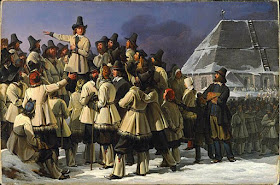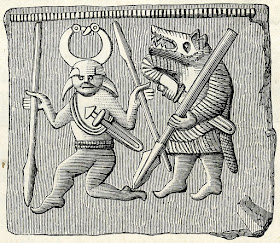Pages
▼
Sunday, December 31, 2017
Saturday, December 23, 2017
Saturday, December 16, 2017
Sunday, December 10, 2017
Founders: Who was Muawiya I?
In the 7th century, a new religion
emerged in the inhospitable deserts of Arabia – Islam. Alongside with Islam, a
new empire also emerged. Born from internal struggle, the Umayyad Caliphate
became stronger and more organized than before. Credit to this reemergence
mostly went to its founder – Muawiyah bin Abi Sufyan.
Saturday, December 2, 2017
Tuesday, November 14, 2017
Conquest of Tariq ibn Ziyad
In
the southern tip of Spain stands a giant monolith that became known as the
European side of the Pillars of Hercules where the Mediterranean Sea met the
Atlantic. This monolith, the Rock of Gibraltar, bears a legacy of Muslim Spain.
In fact, it bears the name of the man who started the Muslim conquest of the Iberian
Peninsula – Tariq ibn Ziyad.
Saturday, November 11, 2017
A Brief History of Genoa
The Most Serene Republic of Venice dominated
commerce in the Mediterranean for centuries leading to its ascendancy as a
great power. But as Venice stood mighty in the Aegean Sea, another posed as its
rival in the other side of the Italian Peninsula. In the Lingurian Sea, Genoa rivaled Venice and shared its tradition as a commercial maritime power and a
republican city-state.
Saturday, November 4, 2017
Tuesday, October 31, 2017
Guglielmo Boccanegra: Captain of the People
Guglielmo
Boccanegra made a name for himself in Genoese politics of the 13th century. After
being an experienced official from a non-aristocratic family, Boccanegra ruled
over prosperous yet a divided Genoa. He came to power as Captain of the Popolo
or the People elected by the people. His government presided over financial
reforms and achieved considerable diplomatic developments. Although his rule
was short, he made an impact to the political life of Genoa for centuries.
Saturday, October 28, 2017
Who were the Guelfs and Ghibellines?
Dante
and Petrarch had many commonalities – they were great literary figures, they
contributed to the development of Italian literature, and they both experienced
the political divide between Guelfs and Ghibellines. The rivalry between
Ghibellines and Guelfs led to the expulsion of Dante and Petrarch’s family as
they sided with the Guelfs. But this rivalry between Ghibellines and Guelfs not
only created an impact on the lives of this 2 figures, but also created a mark
in the political history of Italy.
Sunday, September 17, 2017
Saturday, September 9, 2017
Sunday, August 27, 2017
The Sultanate of Delhi: The Khalji Dynasty
Before
the Mughal Empire boasted its sub-continental Empire, the Sultanate of Delhi
existed and ruled most of India becoming a powerhouse in a divided India. The
Mamluk Dynasty established and secured the Sultanate’s existence, but the House
of Khalji worked to keep it and to expand its dominion over the rest of India.
Sunday, August 20, 2017
The Sultanate of Delhi: The Mamluk Dynasty
 Before
the Mughal Empire came to be, the Sultanate of Delhi stood as the most powerful
state in all of Northern India. A Sultanate founded by Afghan warlords, it
dominated its neighbors, defended itself against Mongols, and ruled by Sultan
with each having a different personality. Explore this Sultanate that endured
for centuries until the conquest of Babur came.
Before
the Mughal Empire came to be, the Sultanate of Delhi stood as the most powerful
state in all of Northern India. A Sultanate founded by Afghan warlords, it
dominated its neighbors, defended itself against Mongols, and ruled by Sultan
with each having a different personality. Explore this Sultanate that endured
for centuries until the conquest of Babur came.Sunday, July 9, 2017
Wednesday, May 31, 2017
Monday, May 1, 2017
Sunday, April 30, 2017
Friday, April 28, 2017
Friday, March 31, 2017
Sunday, March 26, 2017
Saturday, March 11, 2017
Sunday, February 26, 2017
Who were the Berserkers?
Dictionaries
defined berserk as out of control with anger or excitement; wild or frenzied.
The word earned such a meaning from the most feared warrior among the Vikings –
the Berserkers. These wild and aggressive warriors fought their way in history
clad with animal skins and armed with axes, swords, shields, and uncontrollable
rage.
Who was Johann Struensee?
 Enlightened
absolutism, an idea where the ideas of the Enlightenment championed and
implemented by monarchies ruling through divine right, spread across Europe in
the 18th century. From Russia to Spain, monarchies called for rule of law,
reason, and liberalism. Denmark on the other hand experienced absolute
absolutism under a strange circumstances. Reforms aligned to the Enlightenment
movement befell Denmark under the hands of a foreign German doctor named Johann
Struensee.
Enlightened
absolutism, an idea where the ideas of the Enlightenment championed and
implemented by monarchies ruling through divine right, spread across Europe in
the 18th century. From Russia to Spain, monarchies called for rule of law,
reason, and liberalism. Denmark on the other hand experienced absolute
absolutism under a strange circumstances. Reforms aligned to the Enlightenment
movement befell Denmark under the hands of a foreign German doctor named Johann
Struensee. Tuesday, February 7, 2017
Sunday, January 29, 2017
Wednesday, January 25, 2017
The Great Heathen Army (Part 1): Fall of Northumbria
It
was an army of Vikings with the objective to avenge and conquer England.
Because of their known ruthlessness and savagery the English chroniclers
labelled them as the Great Heathen Army. But others labelled it as the Great
Danish Army for most of its warriors came from Denmark. Explore what was the Great
Heathen Army? Why was it formed and invaded England? How did it prevailed? And
how did it created an impact on history?



































